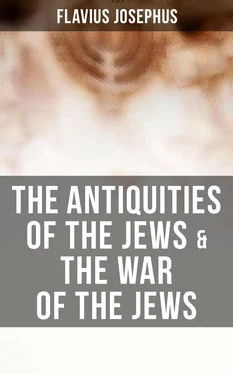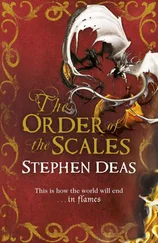2. When David had cast the Jebusites out of the citadel, he also rebuilt Jerusalem, and named it The City of David, and abode there all the time of his reign; but for the time that he reigned over the tribe of Judah only in Hebron, it was seven years and six months. Now when he had chosen Jerusalem to be his royal city, his affairs did more and more prosper, by the providence of God, who took care that they should improve and be augmented. Hiram also, the king of the Tyrians, sent ambassadors to him, and made a league of mutual friendship and assistance with him. He also sent him presents, cedar-trees, and mechanics, and men skillful in building and architecture, that they might build him a royal palace at Jerusalem. Now David made buildings round about the lower city: he also joined the citadel to it, and made it one body; and when he had encompassed all with walls, he appointed Joab to take care of them. It was David, therefore, who first cast the Jebusites out of Jerusalem, and called it by his own name, The City of David: for under our forefather Abraham it was called (Salem, or) Solyma; 2but after that time, some say that Homer mentions it by that name of Solyma, (for he named the temple Solyma, according to the Hebrew language, which denotes security.) Now the whole time from the warfare under Joshua our general against the Canaanites, and from that war in which he overcame them, and distributed the land among the Hebrews, (nor could the Israelites ever cast the Canaanites out of Jerusalem until this time, when David took it by siege,) this whole time was five hundred and fifteen years.
3. I shall now make mention of Araunah, who was a wealthy man among the Jebusites, but was not slain by David in the siege of Jerusalem, because of the good-will he bore to the Hebrews, and a particular benignity and affection which he had to the king himself; which I shall take a more seasonable opportunity to speak of a little afterwards. Now David married other wives over and above those which he had before: he had also concubines. The sons whom he had were in number eleven, whose names were Amnon, Emnos, Eban, Nathan, Solomon, Jeban, Elien, Phalna, Ennaphen, Jenae, Eliphale; and a daughter, Tamar. Nine of these were born of legitimate wives, but the two last-named of concubines; and Tamar had the same mother with Absalom.
1What our other copies say of Mount Sion, as alone properly called the city of David, 2 Samuel 5:6-9, and of this its siege and conquest now by David, Josephus applies to the whole city Jerusalem, though including the citadel also; by what authority we do not now know perhaps, after David had united them together, or joined the citadel to the lower city, as sect. 2, Josephus esteemed them as one city. However, this notion seems to be confirmed by what the same Josephus says concerning David's and many other kings of Judah's sepulchers, which as the authors of the books of Kings and Chronicles say were in the city of David, so does Josephus still say they were in Jerusalem. The sepulcher of David seems to have been also a known place in the several days of Hyrcanus, of Herod, and of St. Peter, Antiq. B. XIII. ch. 8. sect. 4 B. XVI. ch. 8. sect. 1; Acts 2:29. Now no such royal sepulchers have been found about Mount Sion, but are found close by the north wall of Jerusalem, which I suspect, therefore, to be these very sepulchers. See the note on ch. 15. sect. 3. In the meantime, Josephus's explication of the lame, and the blind, and the maimed, as set to keep this city or citadel, seems to be the truth, and gives the best light to that history in our Bible. Mr. Ottius truly observes, (up. Hayercamp, p. 305,) that Josephus never mentions Mount Sion by that name, as taking it for an appellative, as I suppose, and not for a proper name; he still either styles it The Citadel, or The Upper City; nor do I see any reason for Mr. Ottius's evil suspicions about this procedure of Josephus.
2Some copies of Josephus have here Solyma, or Salem; and others Hierosolyma, or Jerusalem. The latter best agree to what Josephus says elsewhere, (Of the War, B. VI. ch. 10.,) that this city was called Solyma, or Salem, before the days of Melchisedec, but was by him called Hierosolyma, or Jerusalem. I rather suppose it to have been so called after Abraham had received that oracle Jehovah Jireh, "The Lord will see, or provide," Genesis 22;14. The latter word, Jireh, with a little alteration, prefixed to the old name Salem, Peace, will be Jerusalem; and since that expression, "God will see," or rather, "God will provide himself a lamb for a burnt-offering," ver. 8, 14, is there said to have been proverbial till the days of Moses, this seems to me the most probable derivation of that name, which will then denote that God would provide peace by that "Lamb of God which was to take away the sins of the world." However, that which is put into brackets can hardly be supposed the genuine words of Josephus, as Dr. Hudson well judges.
CHAPTER 4
That When David Had Conquered The Philistines Who Made War Against Him At Jerusalem, He Removed The Ark To Jerusalem And Had A Mind To Build A Temple
Table of Contents
1. When the Philistines understood that David was made king of the Hebrews, they made war against him at Jerusalem; and when they had seized upon that valley which is called The Valley of the Giants, and is a place not far from the city, they pitched their camp therein; but the king of the Jews, who never permitted himself to do any thing without prophecy, 1and the command of God and without depending on him as a security for the time to come, bade the high priest to foretell to him what was the will of God, and what would be the event of this battle. And when he foretold that he should gain the victory and the dominion, he led out his army against the Philistines; and when the battle was joined, he came himself behind, and fell upon the enemy on the sudden, and slew some of them, and put the rest to flight. And let no one suppose that it was a small army of the Philistines that came against the Hebrews, as guessing so from the suddenness of their defeat, and from their having performed no great action, or that was worth recording, from the slowness of their march, and want of courage; but let him know that all Syria and Phoenicia, with many other nations besides them, and those warlike nations also, came to their assistance, and had a share in this war, which thing was the only cause why, when they had been so often conquered, and had lost so many ten thousands of their men, they still came upon the Hebrews with greater armies; nay, indeed, when they had so often failed of their purpose in these battles, they came upon David with an army three times as numerous as before, and pitched their camp on the same spot of ground as before. The king of Israel therefore inquired of God again concerning the event of the battle; and the high priest prophesied to him, that he should keep his army in the groves, called the Groves of Weeping, which were not far from the enemy's camp, and that he should not move, nor begin to fight, till the trees of the grove should be in motion without the wind's blowing; but as soon as these trees moved, and the time foretold to him by God was come, he should, without delay, go out to gain what was an already prepared and evident victory; for the several ranks of the enemy's army did not sustain him, but retreated at the first onset, whom he closely followed, and slew them as he went along, and pursued them to the city Gaza (which is the limit of their country): after this he spoiled their camp, in which he found great riches; and he destroyed their gods.
2. When this had proved the event of the battle, David thought it proper, upon a consultation with the elders, and rulers, and captains of thousands, to send for those that were in the flower of their age out of all his countrymen, and out of the whole land, and withal for the priests and the Levites, in order to their going to Kirjathjearim, to bring up the ark of God out of that city, and to carry it to Jerusalem, and there to keep it, and offer before it those sacrifices and those other honors with which God used to be well-pleased; for had they done thus in the reign of Saul, they had not undergone any great misfortunes at all. So when the whole body of the people were come together, as they had resolved to do, the king came to the ark, which the priest brought out of the house of Aminadab, and laid it upon a new cart, and permitted their brethren and their children to draw it, together with the oxen. Before it went the king, and the whole multitude of the people with him, singing hymns to God, and making use of all sorts of songs usual among them, with variety of the sounds of musical instruments, and with dancing and singing of psalms, as also with the sounds of trumpets and of cymbals, and so brought the ark to Jerusalem. But as they were come to the threshing-floor of Chidon, a place so called, Uzzah was slain by the anger of God; for as the oxen shook the ark, he stretched out his hand, and would needs take hold of it. Now, because he was not a priest 2and yet touched the ark, God struck him dead. Hereupon both the king and the people were displeased at the death of Uzzah; and the place where he died is still called the Breach of Uzzah unto this day. So David was afraid; and supposing that if he received the ark to himself into the city, he might suffer in the like manner as Uzzah had suffered, who, upon his bare putting out his hand to the ark, died in the manner already mentioned, he did not receive it to himself into the city, but he took it aside unto a certain place belonging to a righteous man, whose name was Obededom, who was by his family a Levite, and deposited the ark with him; and it remained there three entire months. This augmented the house of Obededom, and conferred many blessings upon it. And when the king heard what had befallen Obededom, how he was become, of a poor man in a low estate, exceeding happy, and the object of envy to all those that saw or inquired after his house, he took courage, and, hoping that he should meet with no misfortune thereby, he transferred the ark to his own house; the priests carrying it, while seven companies of singers, who were set in that order by the king, went before it, and while he himself played upon the harp, and joined in the music, insomuch, that when his wife Michel, the daughter of Saul, who was our first king, saw him so doing, she laughed at him. But when they had brought in the ark, they placed it under the tabernacle which David had pitched for it, and he offered costly sacrifices and peace-offerings, and treated the whole multitude, and dealt both to the women, and the men, and the infants a loaf of bread and a cake, and another cake baked in a pan, with the portion of the sacrifice. So when he had thus feasted the people, he sent them away, and he himself returned to his own house.
Читать дальше












